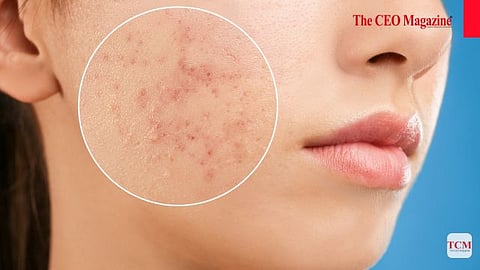
- News
- Women
- Magazine
- IndustryIndustry
- InsightsInsights
- Success Stories
- PublishPublish
- ContactContact
- Media KitMedia Kit

Acne
Causes, Symptoms, and Treatment
Acne, often referred to as pimples or zits, is a common skin condition that affects people of all ages, but primarily teenagers and young adults. It occurs when hair follicles under the skin become clogged, leading to outbreaks of lesions on the skin.
These lesions may appear as blackheads, whiteheads, papules, pustules, nodules, or cysts. While acne is most commonly found on the face, it can also appear on the back, chest, and shoulders.
The primary cause of acne is the clogging of pores due to a combination of factors. Sebum, an oily substance that helps keep the skin moisturised, along with dead skin cells, can plug the pores. Additionally, bacteria living on the skin can exacerbate acne by causing inflammation.
Hormonal changes, particularly during adolescence, play a significant role in acne development. Increased levels of androgen hormones, such as testosterone, stimulate the sebaceous glands to produce more sebum, further contributing to pore blockage.
Acne presents with various symptoms, including pimples, papules, blackheads, whiteheads, nodules, and cysts. These lesions can range from mild to severe, with severe cases potentially leading to scarring.
There are different types of acne, such as cystic acne, hormonal acne, nodular acne, and fungal acne, each requiring specific treatment approaches.
Fungal acne (pityrosporum folliculitis): Caused by yeast buildup in hair follicles, resulting in itchy and inflamed bumps.
Cystic acne: Characterised by deep, pus-filled pimples and nodules that can cause scarring.
Hormonal acne: Linked to hormonal changes, particularly in adults, leading to excess sebum production and pore blockage.
Nodular acne: A severe form of acne-causing tender, nodular lumps under the skin and surface pimples.
Several factors can trigger or worsen acne outbreaks. These include wearing tight-fitting clothing or headgear, exposure to air pollution and high humidity, use of oily or greasy personal care products, stress, certain medications, and picking at acne lesions. Some studies suggest a link between diet and acne, with high-sugar diets potentially exacerbating symptoms.
Diagnosing acne typically involves a visual examination by a healthcare provider. They may inquire about symptoms, family history, stress levels, and medication use.
Treatment options vary depending on the severity of the acne and may include topical medications, oral medications, hormone therapy, or additional therapies like steroids, lasers, or chemical peels. Antibiotics are commonly prescribed to target bacteria and reduce inflammation associated with acne.
While acne cannot always be completely prevented, adopting a consistent skincare routine can help reduce the risk of breakouts.
This includes daily face washing with a gentle cleanser, using oil-free moisturisers, avoiding comedogenic makeup products, refraining from touching the face, and practising good hygiene habits. It's essential to avoid squeezing or picking at acne lesions to prevent scarring.
Many acne treatments, especially oral and topical medications, may not be safe for pregnant individuals. It's crucial to consult with a healthcare provider before starting any treatment regimen, particularly if you're pregnant or planning to become pregnant. Additionally, patience is key when treating acne, as it may take several weeks or even months to see significant improvement.
Acne is a prevalent skin condition that can have a significant impact on one's self-esteem and overall well-being. While it may be challenging to manage, various treatment options are available to help clear acne and prevent scarring.
By understanding the causes, symptoms, and triggers of acne, individuals can take proactive steps to manage their condition effectively and maintain healthy skin. Remember, seeking guidance from a healthcare provider is essential to develop an appropriate treatment plan tailored to individual needs and circumstances.
Follow us on Google News
